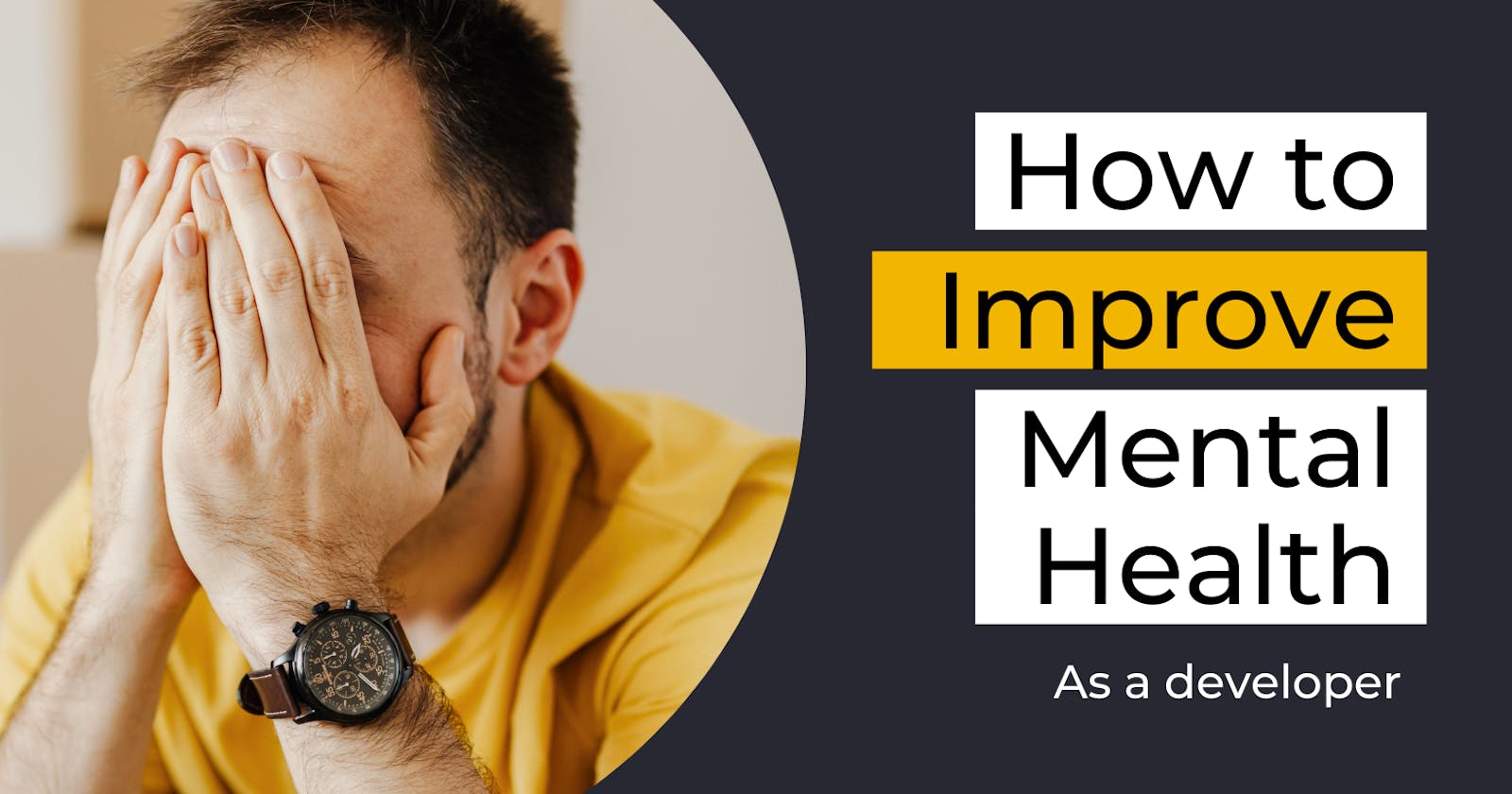Take care of your Mental Health as a Developer
Embracing Balance and Well-being
Introduction
Ever felt like your passion for coding slowly turned into a daily battle? Picture this: drowning in multiple projects, losing the joy you once found in your work. I've been there. Join me on a journey where the weight of responsibility almost crushed my enthusiasm, but a colleague's advice sparked a change. Let me share how I rediscovered balance and mental peace in a coding chaos.
Slowly burning down
As developers, we often find ourselves entangled in the web of multitasking, juggling various projects simultaneously. The weight of responsibilities can gradually burgeon, transforming our passion for coding into a burden. I recently traversed this challenging terrain, feeling the weight of increasing pressure overshadow the joy I once found in my work.
Balancing multiple projects soon became an overwhelming endeavor, and the mounting responsibility took a toll on my mental well-being. The internal disruption became a daily struggle, gradually chipping away at my enthusiasm. The tipping point arrived when I found myself returning home devoid of joy, emotions bottled up until they couldn't be contained any longer.
Revelation and Turning Point
Acknowledging the damaging impact on my mental health became a pivotal moment. Feeling weighed down by my struggles, I reached out to a colleague who'd been through similar situations. Their experience offered me priceless advice and support.
“Don't let the projects consume you!” my colleague advised.
“While it's commendable to invest yourself in your work, maintaining a healthy emotional distance is vital. Your heart can be in the project, but remember, it's still work. When you return home, create that space for yourself, allowing room to rest and recharge.”

8 Essential Advices
Setting Realistic Goals: Embrace the essence of setting achievable goals. Instead of aiming for the impossible, break down tasks into smaller, manageable components. Realistic targets not only boost productivity but also alleviate the mental strain. Celebrate small victories along the way.
Take Breaks and Disconnect: In a world connected by technology, it's easy to be consistently plugged into work. Don't forget the importance of breaks. Step away from the screen, go for a walk, exercise, or engage in hobbies. These pauses rejuvenate the mind and allow fresh perspectives.
Establish Boundaries: Define work hours and respect them. Setting boundaries ensures a healthy work-life balance. Let colleagues and clients know your availability, fostering a culture of respect for personal time. Leaving early doesn't make you a jerk; it's about self-care, and that means better project outcomes for the company in the long run!
Self-imposed expectations often lead us down a path of self-destruction. The belief that we must conquer every task at the cost of our mental well-being is flawed. When something isn’t feasible, you should communicate it promptly. Working through the night may seem like a solution, but it typically worsens the problem.
Continuous Learning and Growth: Keep learning, not just in your coding niche, but also about stress management and mental health. Explore mindfulness, meditation, or other practices that help in maintaining emotional equilibrium.
Seek Support Networks: Build a support network within the development community or beyond. Engage with like-minded individuals, share experiences, and learn from others' coping strategies. Don't hesitate to seek professional help if the stress becomes overwhelming.
I used to believe that everyone operated as flawless machines, effortlessly managing immense pressure while radiating happiness. It's only recently that I've come to understand how many conceal their pain and struggles to present a polished facade. However, it's vital to embrace our humanity and imperfections rather than striving for an unattainable perfection. This is a lesson I learned while having deep conversations with my colleagues.
Reflect and Adapt: Regularly reflect on your work habits and stress triggers. Adapt and evolve strategies to manage stress effectively. Not all solutions work for everyone, so be open to trying different methods until you find what suits you best.
Cultivate Positivity: Fostering a positive outlook can significantly impact mental well-being. Embrace gratitude, celebrate achievements, and acknowledge progress made, no matter how small.
Normalize Open Conversations: Cultivate a work culture that normalizes discussions on mental health. Encourage open conversations and support amongst team members. Collective support goes a long way in alleviating stress and fostering a healthy work environment.
Remember, prioritizing mental health is a journey, not a destination. By incorporating these practices into your routine, you can steadily enhance your well-being and find a healthier balance between work and life.
The key to reducing pressure is communication.
One crucial lesson resonated profoundly: communication is crucial. Hiding our struggles may seem a sign of strength, but reaching out is where true strength lies. My colleague emphasized the importance of voicing our struggles, be it to a Project Manager or someone in a position of authority. They, too, are human and may not be able to tell what's going on inside us unless we say it.
“Say no when needed” my colleague emphasized. “Don't succumb to the pressure of saying yes to everything. It's okay to communicate delays or when a workload becomes unmanageable. There's no need to bear the weight alone.”
Conclusion: Striking a Balance
The journey toward balance and mental well-being is ongoing. As developers, we are driven by a passion for our craft. But learning to separate, communicate, and accept personal boundaries is important for our overall health and longevity in the industry.
Let's strive for a balance that nurtures our passion without compromising our mental health. Remember, taking care of oneself is not a sign of weakness, but a testament to strength and resilience!
Hope you enjoyed reading my blog post!
Feel free to share any additional mental health management tips or strategies in the comments below! Your insights and experiences could greatly help others navigating similar challenges.


